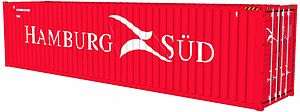Hamburg Süd
 | |
 The container ship Cap San Antonio heading to the Port of Hamburg, April 2014 | |
| Private | |
| Industry | Transport |
| Founded | 1871 |
| Headquarters | Hamburg, Germany |
Key people |
Dr. Ottmar Gast (Chairman of the Executive Board) Peter Frederiksen, Heino Schmidt, Frank Smet, Arnt Vespermann (Members of Executive Board) |
| Products |
Shipping Freight distribution Others |
| Revenue | €5.470 billion 2012 |
Number of employees | 4,512 (2012) |
| Website |
www |

Hamburg Süd is a shipping line on the North-South ocean trade routes, in which was part of the Oetker Group and sold to A.P. Moller–Maersk Group's shipping division Maersk Line [1][2]
History

In 1871 Hamburg Südamerikanische Dampfschifffahrts-Gesellschaft [note 1] (Hamburg - South America Steam Shipping Company or Hamburg South America Line) was established by a conglomerate of 11 Hamburg-based merchant houses.[3] Three steam-ships totalling 4,000 GRT provided a monthly shipping service to Brazil and Argentina.[3]
By 1914 the company was operating over 50 ships totaling approximately 325,000 GRT. World War I culminated in the loss of all Hamburg Süd's vessels, and the company was forced to begin again by chartering vessels.
The early 1950s saw the company embark on tramp shipping and tanker shipping, and large growth of refrigerated cargoes. In 1955 the Dr. August Oetker company took the company over, and began rapid expansion of the liner and passenger services.
The takeover of Deutsche Levante Linie in 1956 saw the company commence its first foray into the Mediterranean. 1957 saw liner services begin between North America and Australia/New Zealand, with the Columbus New Zealand being the first container ship to ply trade-lanes in the region in 1971, pioneering containerization in the Pacific.
Roles in war
- The Cap Trafalgar was a brand-new passenger liner, having been completed only on March 1, 1914 and had commenced her maiden voyage only on March 10, 1914. Germany had lightly armed the vessel with two 10.5 cm guns and 6 heavy machine guns, and had removed one of the three steam-funnels and re-coloured the vessel to disguise it as a British liner. The vessel encountered the British fully armed ex-steam liner Carmania about 700 miles east of the Brazilian coast, near the island of Trindade, at 9:30 a.m. on September 14, 1914. After a heated exchange of fire between the two ships, the Cap Trafalgar began listing to the left, then sunk bow-first.
- The Cap Arcona, arguably one of the most beautiful passenger liners in its time, was converted to serve the Kriegsmarine (German Navy) as a converted transport vessel in 1940. At the end of 1944 it was then commandeered as a troopship, primarily transporting refugees and prisoners of war along the Baltic Sea. Loaded with 4,500 prisoners at Lübeck Bay, it was attacked by Royal Air Force Typhoons in an air-raid. The Cap Arcona remained capsized in Lübeck Bay until 1950 and was then taken apart by divers, over a period of years, and scrapped. The wreckage was registered and photographed in detail by Rolls Royce, who had produced the RAF's rockets, to assess their effectiveness.
Corporate takeovers

Hamburg Süd also owns Brazilian operator Aliança and Spanish operator Ybarra Sud. It has taken over many companies over the years including Ellerman, Kien Hung, South Seas Steamship, Deutsche-Nah-Ost-Linie, Royal Mail Line, Pacific Steam Navigation Company, Swedish Laser Lines, Rotterdam Zuid-America Lijn (RZAL), Havenlijn and the Inter-America services of Crowley American Transport. In the past parts of Hamburg Süd has been known as Columbus Line. Since 2004 the services of Columbus Line are directly integrated into Hamburg-Süd. The current container fleet of dry boxes has a distinctive red color with a huge flag and white HAMBURG SÜD logo on the side.
The refrigerated boxes are white with the flag and navy blue lettering.
Humanitarian aid

Hamburg Süd supports international aid organisations with in-house shipping facilities. In the shortest possible time, relief supplies and technical or medical equipment are transported where needed, typically after natural disasters such as hurricanes, earthquakes, and volcanic eruptions.
Hamburg Süd maintains a long-term relationship to SOS Children's Villages, supporting their projects in different countries. Hamburg Süd also supports various initiatives in the fields of education and culture, including the United Buddy Bears exhibitions.
See also
Notes
- ↑ The triple f is correct; it is from a misspelling in the company's original registration in Germany.
References
External links and references
| Wikimedia Commons has media related to Hamburg Süd. |